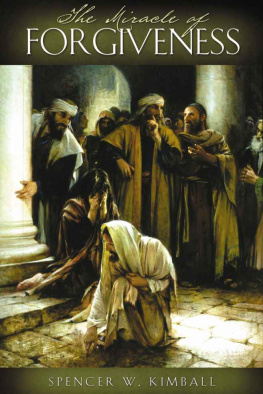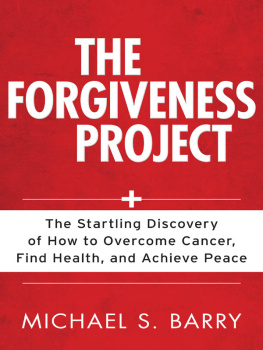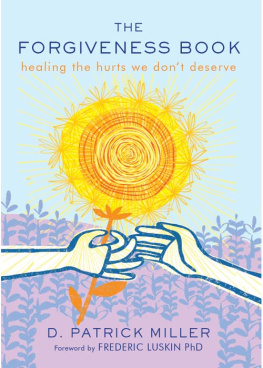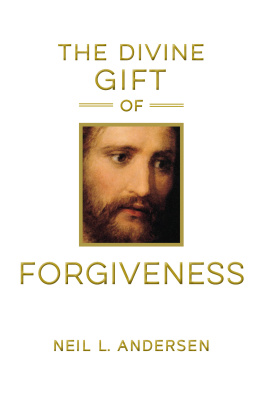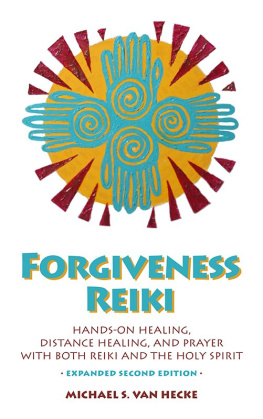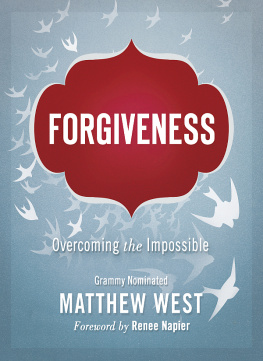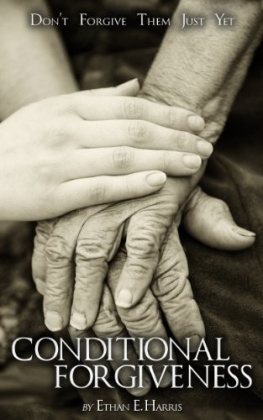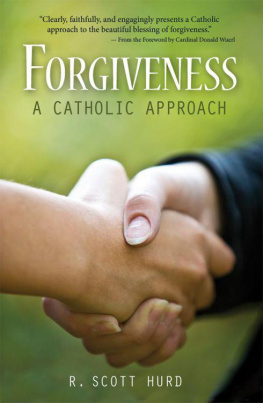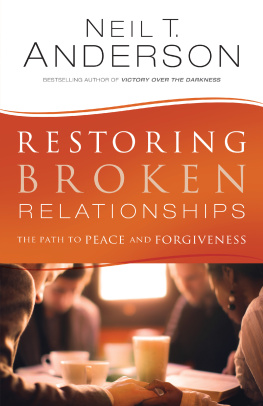The Miracle of Forgiveness
Spencer W. Kimball
1969 Deseret Book Company.
All rights reserved. No part of this book may be reproduced in any form or by any means without permission in writing from the publisher, Deseret Book Company, P.O. Box 30178, Salt Lake City Utah 30178. This work is not an official publication of The Church of Jesus Christ of Latter-day Saints. The views expressed herein are the responsibility of the author and do not necessarily represent the position of the Church or of Deseret Book. Deseret Book is a registered trademark of Deseret Book Company.
Preface
And God wrought special miracles Acts 19:11.)
Our Lord, Jesus Christ, is that God of miracles. On one occasion, he said to the Jewish believers: "And ye shall know the truth, and the truth shall make you free." (John 8:32.)
Can any miracle compare with that one which is provided by Jesus? "... to loose the bands of wickedness, to undo the heavy burdens, and to let the oppressed go free ..." (Isaiah 58:6.) He healed the sick, cast out devils, calmed the storm and even raised the dead. But can any miracle be equal to that one which frees men from the fetters of ignorance, superstition, and transgression? The Prophet Joseph Smith said: "It is better to save a man than raise one from the dead."
Paul said: "O death, where is thy sting? O grave, where is thy victory? The sting of death is sin ." (1 Cor. 15:55-56.) And this prompts the statement, "There is no tragedy except in sin."
This book is not presented to entertain, but rather it has the serious purpose of presenting scriptures, experiences and exhortations with the hope that thereby many will be enticed to repent of their sins and indiscretions and set out to purify and perfect their lives.
This design arose from my years of ministry as a stake president and as an apostle, during which time I have had many experiences in dealing with transgressors, especially those involved in sexual sins, both inside and outside of marriage.
The scriptures being the firm basis of law and happiness, I have constantly felt the need of a selection of them which I could recommend to the offenders. My jottings of references grew into a collection from which this book has evolved.
Because men and women are human and normally carnally minded, and because to do evil is usually easier than to do right, and because "all have sinned and come short of the glory of God," perhaps I have quoted far more scriptures on this subject of sexual sin than on any other.
To cure spiritual diseases which throttle us and plague our lives, the Lord has given us a sure cure-repentance.
I had made up my mind that I would never write a book and was even more determined when I read Job's warning: "Oh ... that mine adversary had written a book." (Job 31:35.) Three main reasons changed my mind.
First, the need. When I come in contact almost daily with broken homes, delinquent children, corrupt governments, and apostate groups, and realize that all these problems are the result of sin, I want to shout with Alma: "O ... that I might go forth ... with a voice to shake the earth, and cry repentance unto every people." (Alma 29:1.)
Hence this book indicates the seriousness of breaking God's commandments; shows that sin can bring only sorrow, remorse, disappointment, and anguish; and warns that the small indiscretions evolve into larger ones and finally into major transgressions which bring heavy penalties. Because of the prevalence and gravity of sexual and other major sins, these receive particular emphasis. Warning signals and guidelines are given to reduce the danger of one's being blindly enticed into forbidden paths.
Having come to recognize their deep sin, many have tended to surrender hope, not having a clear knowledge of the scriptures and of the redeeming power of Christ.
Second, then, I write to make the joyous affirmation that man can be literally transformed by his own repentance and by God's gift of forgiveness which follows for all except unpardonable sins. It is far better not to have committed the sin; the way of the transgressor is hard; but recovery is possible.
Third, those of us whom the Lord has called to leadership have an inescapable responsibility, like that of Jacob and Joseph, to [take] upon us the responsibility, answering the sins of the people upon our own heads if we did not teach them the word of God with all diligence; wherefore, by laboring with our might their blood might not come upon our garments. (Jacob 1:19.)
Isaiah warns: "Cry aloud, spare not, lift up thy voice like a trumpet, and shew my people their transgression, and the house of Jacob their sins." (Isaiah 58:1.) Ezekiel sounds the warning to leaders: "... Should not the shepherds feed the flocks?" (Ezek. 34:2.) And then: "... If [the watchman] blow the trumpet, and warn the people ... whosoever ... taketh not warning his blood shall be upon his own head." (Ezek. 33:3-4.)
The trumpet is to sound "... nothing but repentance unto this generation." (D&C 6:9.) Thus the message is to all the world, not only to members of the true Church of Jesus Christ of Latter-day Saints.
These reasons, and the predominance given to the subject in the appeals of every prophet and spiritual leader from Adam onwards, seem to me to justify a book dealing exclusively with sin, repentance and forgiveness. This is so despite the fact that many Church writers have included the subject as part of a more comprehensive work.
In writing this book, I make no claim to originality or to literary genius. There may be nothing new or arresting here. On the other hand, I have deliberately repeated some scriptures to support varying facets of the subject or to insure a proper emphasis in the hope that those frustrated and in sin may wash "their robes in the blood of the Lamb," so that peace may settle down on them as the dews of heaven.
Likewise, in writing about sin and repentance, no intent is implied that either the writer or any of those quoted, except the Lord himself, is without fault. But we would not have much motivation to righteousness if all speakers and writers postponed discussing and warning until they themselves were perfected!
In Jacob's words: "... I know that the words of truth are hard against all uncleanness; but the righteous fear them not, for they love the truth and are not shaken." (2 Ne. 9:40.)
Perhaps some of the same feelings come to us all as came to Peter as he approached the end of his life: Yea, I think it meet, as long as I am in this tabernacle, to stir you up by putting you in remembrance; Knowing that shortly I must put off this my tabernacle, even as our Lord Jesus Christ hath shewed me. Moreover I will endeavour that ye may be able after my decease to have these things always in remembrance. (2 Pet. 1:13-15.)
I accept full responsibility for the contents of this book. Specifically, the Church and its leaders are totally absolved from the responsibility for any error which it may be found to contain.
It is impossible for me or any other mortal to save another's soul, but it is my humble hope that through this book some who are suffering the baleful effects of sin may be helped to find the way from darkness to light, from suffering to peace, from misery to hope, and from spiritual death to eternal life. If to any degree the book achieves this, and helps to confirm others in a life of righteous endeavor, my efforts in its production will have been justified. Spencer W. Kimball

